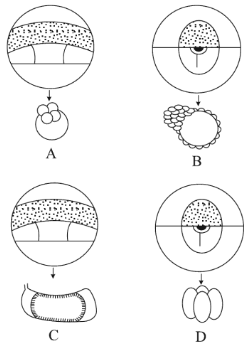 Multiple Choice Questions
Multiple Choice QuestionsThe muscle tone was increased after electrolytic lesion of the caudate nucleus in a cat. The muscle tone decreased within seven days. The following explanations were given by the researcher.
A. The functional recovery was due to plastic changes of nervous system.
B. The brain tissue surrounding the lesioned area was non-functional due to circulatory insufficiently immediately after surgery which led to greater functional loss.
C. The circulatory status in surrounding tissue recovered with time resulting inpartial functiona recovery.
D. The degenerating nerve fibres were regenerated which underlie functional recovery.
A and B
B and C
C and D
A and D
Given below are fate maps of two organisms and the patterns by which embryos undergo cleavage. Which of the following is/ are the right combination (s)?

B only
B and A
A and C
B and D
In the case of Xenopus laevis, which cells make up the Nieuwkoop center and Spemann’s organizer?
Endodermal and mesodermal, respectively
Mesodermal and endodermal, respectively
Endodermal and ectodermal, respectively
Ectodermal and endodermal, respectively
The level of follicle-stimulating hormone (FSH) during infancy and adulthood is the same but spermatogenesis is seen only during adulthood. mRNA levels coding for the FSH receptor are also found to be the same in the testis of both age groups. Which of the following investigations will clarify this paradox a little more?
Culture testicular cells and add LH to see testosterone production
Culture testicular cell and add testosterone to see comparative rise in FSH mRNA from both age groups.
Culture testicular cells and add FSH to see a comparative rise in cAMP production by both age groups.
Add both LH and FSH to testicular cAMP production.
In an experiment, sperm removed from the epididymis of a male mouse was added in a dish containing appropriate media and oocyte. No fertilization was seen. However, when sperm from epididymis were directly placed in the uterus of an ovulated female, she became pregnant. These observations suggest that:
The sperm needs to travel some distance to stain fertilizing ability.
The oocyte secretes some biochemicals or factors which help sperm to fertilize.
The hormones in the body help sperm to attain fertilizing ability.
The contents of the female reproductive tract interact with sperm and activate it for fertilization.
D.
The contents of the female reproductive tract interact with sperm and activate it for fertilization.
The observations suggest that the contents of the female reproductive tract interact with sperm and inactivate it for fertilization.
GnRH is secreted during infancy (0-6 months) and puberty onwards (4 years and above) in monkeys. However, i.v. injection of GnRH during the pre-pubertal period (about 2 years of age) led to elevated LH and FSH in blood compared to untreated 2 years old monkey. This suggests that:
(A) Hypothalamus is active during the pre-pubertal period.
(B) GnRH action on pituitary is age-dependent.
(C) pituitary matures during adulthood.
(D) pituitary is active in all the stages of development in monkeys.
Which one of the following is true?
(A) and (B)
(B) and (C)
(C) only
(D) only
A person suffering from thyrotoxicosis has an extremely high level of thyroid in blood. There is a failure of feedback regulation in the hypothalamine-pituitary-thyroid axis. The detailed blood investigation exhibited high level of the following:
(A) Thyroid-stimulating hormone (TSH)
(B) Thyroid-stimulating immunoglobulin (TSI).
(C) Thyrotropin-releasing hormone (TRH)
(D) Parathyroid hormone (PTH)
In your opinion, which one of the following is the reason for such thyrotoxicosis?
(A) only
(B) only
(A) and (C)
(C) and (D)
In the dark, rods show a large inward "dark" current which is suppressed by a flash of light. Which one of the following statements, explaining the effect of light, is true?
Sodium channels in the outer segment of rods are closed.
Cytoplasmic cGMP concentration increases
Sodium channels in the inner segment of rods are closed.
Transducin dissociates from beta-arrestin
An individual was suffering from digestive complications. It was observed that the individual had a dehydrated gastrointestinal tract. When an advanced investigation was done, the person was found to have defects in the following:
(A) cystic fibrosis transmembrane conductance regulator protein.
(B) glucose transporter protein
(C) Na+/ K+ ATPase
(D) Ca2+ ATPase
Which of the above could be the cause for such a digestive disorder?
(A) only
(B) and (C)
(C) and (D)
(D) only
The action potential was recorder intracellularly from a squid giant axon bathed in two types of fluid such as sea water and artificial sea water having lower concentration of sodium ions while maintaining the same osmotic pressure with chlorine chloride. The nature of action potential was different in the two bathing fluids. Which of the following results is most likely?
The resting transmembrane potential was not changed but the amplitude of action potential was increased with lower sodium concentration in the bathing fluid.
The amplitude of action potential was gradually decreased with reduction of sodium concentration in bathing fluid but the duration of action potential was prolonged.
The resting transmembrane potential was decreased and the amplitude of action potential and the amplitude of action potential was also decreased with lower sodium concentration in the bathing fluid.
The amplitude of action potential was not changed with reduction of sodium concentration in the bathing fluid but the duration of action potential was prolonged.
